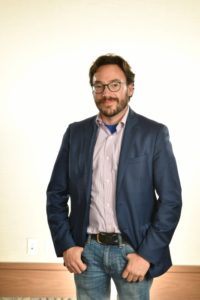Our team of writers work relentlessly behind the scenes to keep the Nexus site constantly updated, but who are these mysterious Camosun College students who keep us supplied with stories? Wonder no more, as our new series Meet Your Writers will help you get to know the names behind the pieces you read at Nexus.
Today, we get to know contributing writer Fred Cameron.
When did you start writing for Nexus?
I started writing for Nexus in the fall of 2017. I had always wanted to be a journalist but tens of thousands of poor decisions led me on a winding path that finally led me up the steps of Richmond House. Looking back it was one of the best decisions I have ever made. As a writer for Nexus I have had the opportunity to explore parts of the world that I didn’t know existed through the eyes of students, faculty, and members of the greater community.

What has your best experience been writing for Nexus?
It’s tough to pick a “best” experience because there were so many good ones. As an arts writer I have had opportunities to connect with my heroes and kick it with them when they come through town. As a features writer I discovered skills that sped up my career development exponentially and enhanced my educational experience. I guess if I had to pick it would be sending a photo of my NHL press credentials to my father when I covered the Canucks game when they came to town last fall.
What about the worst? Be honest!
The worst experience is much easier to pin down. From the start of my time as features writer I had been pitching stories around homelessness and addiction. This isn’t an easy sell at a college paper because the story isn’t relatable to the majority of Camosun students. I tracked down a group of students who had experienced homelessness and successfully pitched the story to the editor. I put everything I had into the piece. It had first-hand accounts from students, past and present, but, more importantly, in my mind, it had a well-articulated description of the current experience on the streets and in the shelters in Victoria. But when I received the edited version, the voice that retold my own experience with addiction, homelessness, soup kitchens, and the accompanying fear and despair was cut from the story. I felt physically sick, like I had lost a portion of myself, but gained valuable knowledge and experience as a writer. You have to know your audience, and I had written that story for myself.
How have you been managing with the COVID-19 lockdown and other measures?
COVID-19 lockdown was incredibly exciting and horrific at once. Working with the homeless population and providing harm-reduction services, we found ourselves on the frontlines of a dual health crisis. As the rest of the world went into isolation, the population on the 900 block of Pandora increased north of 300 people, while services were reduced or even closed.
But at SOLID Outreach we essentially engage in guerilla warfare. Our membership is made up of people from the streets who lead by example and support their community. In other words, I spent the lockdown working around the clock.
What is the most pressing issue facing Camosun students today and based on what you know being a Nexuswriter, what needs to be done about it?
I don’t think things will ever return to normal. Perhaps more important than the course material is our ability to adapt on the fly and to learn to correspond in new and creative ways. To be honest, I don’t think I would have made it through the pandemic if class hadn’t gone online. I struggled mightily to keep up in class, but I was forced to learn quickly because the changes in the classroom mirrored the changes in the office. With many working from home and face-to-face contact limited, management meetings switched to Zoom and conference call, but circuits were often overloaded and we had to catch up by email and improvise when time was an issue. I finished with straight As and improved my professional status immeasurably. But if you stop and look around, the changes are rippling through every aspect of our community, and there is nothing we can do to stop it. However, we can change the way we do things. Skills and knowledge remain invaluable, but the marketplace has changed so quickly that it will be creativity and innovation that will determine success for the foreseeable future. That can start with our approach to school.
